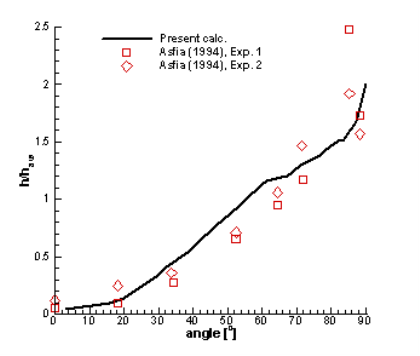Thermal loads on the reactor vessel lower plenum during a severe accident
In order to investigate the cooling of core melt in a lower plenum during severe accident conditions,
a numerical model of natural convection due to volumetric heat generation was prepared. Four different
geometries were taken into consideration. As our primary concern was the model verification, the geometries
were selected from the experimental work of Asfia and collaborators, which is documented in the open
literature [1].

Nusselt number distribution along the lower plenum wall
The calculations were performed with the ANSYS CFX fluid dynamics software. The results of transient
calculations reveal a stable and thermally stratified lower part of the flow, and a much more dynamic upper layer
that is dominated by time dependent structures. The heat flux is the lowest at the stagnation point
and increases along the spherical segment. The ratio of maximum and minimum heat transfer coefficient
can be as high as 50.
Based on the simulation results, the distributions of local heat transfer coefficients along the wall were obtained and compared with the measurements of Asfia et al. [1]. The comparison shows good agreement with the experimental data. We also made a comparison of the calculated global Nusselt numbers with the correlations of Mayinger et al. [2] and Reineke et al. [3]. The agreement between the results that is well inside the experimental scatter verifies the selected modelling approach.
Based on the simulation results, the distributions of local heat transfer coefficients along the wall were obtained and compared with the measurements of Asfia et al. [1]. The comparison shows good agreement with the experimental data. We also made a comparison of the calculated global Nusselt numbers with the correlations of Mayinger et al. [2] and Reineke et al. [3]. The agreement between the results that is well inside the experimental scatter verifies the selected modelling approach.
References
- F.J. Asfia, V.K. Dhir, An Experimental Study of Natural Convection in a Volumetrically Heated Spherical Pool Bounded on Top with a Rigid Wall, Nucl. Eng. Design, 3, 1996, vol. 163, pp. 333-348.
- F. Mayinger, M. Jahn, M. Reineke, V. Steinbrenner, Examination of Thermohydraulic Processes and Heat Transfer in a Core Melt, BMFT RS 48/1, Institut für Verfahrenstechnik der T.U., Hanover, Germany, 1976.
- H.H. Reineke, Numerische Untersuchung der thermohydraulischen Vorgänge und des Warmeuberganges in einer Karnschmelze bei kugelsegmentförmiger Geometrie und bei zufließendem Material von oben, BMFT RS 166-79-05, Band II A1, 1979.
Dr Andrei Horvat
M.Sc. Mechanical Eng.
Ph.D. Nuclear Eng.
phone
+44 79 72 17 27 00
skype
a.horvat
e-mail
mail@caspus.co.uk
M.Sc. Mechanical Eng.
Ph.D. Nuclear Eng.
phone
+44 79 72 17 27 00
skype
a.horvat
mail@caspus.co.uk

